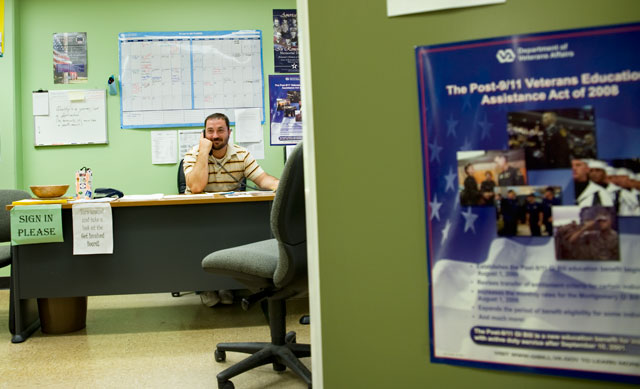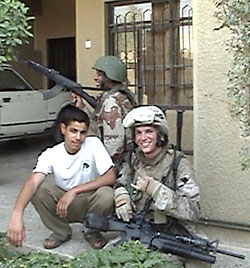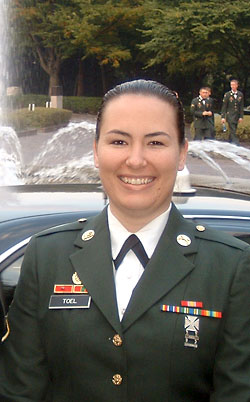
Military life and combat survival produce uniquely close friendships that make readjustment to civilian life a major hurdle for many veterans, who deeply miss their service buddies. The V.E.T.S Office, located in the Library basement, is expressly designed to smooth the transition and provide them with new relationships based on the common experiences gained from serving their country.
“V.E.T.S is a huge help,” says former Marine infantryman Scott Gliosca, who put in two tough tours in Iraq. He was wounded in often-lethal combat patrols in 2004-2005 in the city of Fallujah between Baghdad and Ramadi in the notorious Sunni triangle. “In fact, I wouldn’t be attending HSU this semester if it weren’t for the program,” Gliosca emphasizes. “The college I transferred from near Buffalo, NY, had exactly one person staffing the vets program, a guy I never got to see, and all he did was certify our benefits claim each month.”

With an assist from HSU alumni and a fellow Marine, Gliosca emailed V.E.T.S. chief Kim Hall. “Kim got me accepted here and I was just dumbfounded how helpful everybody in the office was, it was just surreal to me after my experiences in Buffalo. For example, they helped me choose a better route to follow for my benefits. But it’s a lot more than that. It’s a place to go chat with other veterans, likeminded people. It’s a different connection from civilian life that you need every so often.”
Ex-Army MP Brenna Kathleen Toel, California born and bred and one of the V.E.T.S. staff, explains why transition services are crucial. “It’s a very big need, because a lot of the [civilian] people we see don’t know we’re vets. That’s fine, but many of us don’t know how to reach out for help when we get home. The Army has the highest suicide rate for returning troops.”
An MP for five years with lengthy postings in South Korea and Germany, Toel says she still finds civilian culture difficult at times, in part because it is so much more relaxed than the military, where soldiers are expected to be highly disciplined and obedience to authority is absolute. So occasionally she is frustrated when students are 10 minutes late for class and she arrives 10 minutes early. Nor does she feel free to speak out vociferously in the classroom, considering it rude. Her feelings were reinforced by her service in South Korea, where the people “taught me a great deal about respect for one’s elders. I thought I had it—and to some extent I did—but the Koreans have reverence for their elders. That really impressed me and stuck with me.”

Like Gliosca, Toel says the camaraderie she finds at the V.E.T.S. Office is just the thing for the kind of friendships she came to cherish in the Army. “Those were people who went out with me every day. They put on a vest and they put on a gun, and said, ‘OK, I’ll step up.' I knew there were some of them who’d do anything for me.” She served in South Korea during a time when North Korea was conducting missile tests and pursuing nuclear advances and she was stationed only two hours south of the demilitarized zone, where the two nations have been at daggers drawn for more than 50 years. “It was scary, but we knew we would bleed for each other,” she says of her comrades-in-arms. “It’s a very tight bond, much more so than meeting somebody at a coffee house and starting to become friends. We [V.E.T.S staff] offer a place for our fellow vets to come and hang out, and they can ease back into civilian life with other vets, who have been through the same thing.”